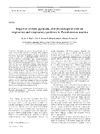Identificador persistente para citar o vincular este elemento:
https://accedacris.ulpgc.es/jspui/handle/10553/50862
| Campo DC | Valor | idioma |
|---|---|---|
| dc.contributor.author | Roy, Sylvie O. | en_US |
| dc.contributor.author | Packard, Ted T. | en_US |
| dc.contributor.author | Berdalet, Elisa | en_US |
| dc.contributor.author | St-Amand, Liliane | en_US |
| dc.date.accessioned | 2018-11-24T19:27:50Z | - |
| dc.date.available | 2018-11-24T19:27:50Z | - |
| dc.date.issued | 1999 | en_US |
| dc.identifier.issn | 0948-3055 | en_US |
| dc.identifier.uri | https://accedacris.ulpgc.es/handle/10553/50862 | - |
| dc.description.abstract | Physiological rates of CO2 production and O2 consumption, and the activities of isocitrate dehydrogenase (IDH) and the electron transfer system (ETS) were studied in the marine bacterium Pseudomonas nautica growing on acetate. In exponential growth, IDH and ETS activities were well coupled with CO2 production and O2 consumption rates, but in senescence they were uncoupled. Our results clearly show that under starvation conditions, IDH and ETS activities remained high even though their corresponding respiration rates dropped. The respiratory metabolism in the different physiological states of the acetate-grown cultures was compared with previous observations made in pyruvate-grown cultures. Time profiles of CO2 production and O2 consumption rates showed completely different respiratory fingerprints associated with the different carbon sources. Acetate-grown cultures showed an increase of respiratory quotients (RQ) in the senescence phase whereas in pyruvate-grown cultures it stayed close to 1.0. On both carbon sources, respiration to respiratory capacity ratios were constant in exponential phase and decreased to almost zero after carbon source exhaustion. Our results clearly show the impact of physiological state and carbon sources on bacterial respiration rates | en_US |
| dc.language | eng | en_US |
| dc.publisher | 0948-3055 | |
| dc.relation.ispartof | Aquatic Microbial Ecology | en_US |
| dc.source | Aquatic Microbial Ecology [ISSN 0948-3055], v. 17, p. 105-110 | en_US |
| dc.subject | 251001 Oceanografía biológica | en_US |
| dc.subject.other | CO2 production rates | en_US |
| dc.subject.other | O2 consumption rates | en_US |
| dc.subject.other | Isocitrate dehydrogenase | en_US |
| dc.subject.other | Respiratory electron transfer system | en_US |
| dc.subject.other | ETS | en_US |
| dc.subject.other | Marine bacterium | en_US |
| dc.title | Impact of acetate, pyruvate, and physiological state on respiration and respiratory quotients in Pseudomonas nautica | en_US |
| dc.type | info:eu-repo/semantics/article | en_US |
| dc.type | Article | en_US |
| dc.identifier.doi | 10.3354/ame017105 | en_US |
| dc.identifier.scopus | 0033022589 | - |
| dc.contributor.authorscopusid | 8923658500 | - |
| dc.contributor.authorscopusid | 7004249480 | - |
| dc.contributor.authorscopusid | 55975291500 | - |
| dc.contributor.authorscopusid | 56636766200 | - |
| dc.description.lastpage | 110 | - |
| dc.description.firstpage | 105 | - |
| dc.relation.volume | 17 | - |
| dc.investigacion | Ciencias | en_US |
| dc.type2 | Artículo | en_US |
| dc.utils.revision | Sí | en_US |
| dc.identifier.ulpgc | Sí | es |
| dc.description.jcr | 2,676 | |
| dc.description.jcrq | Q1 | |
| dc.description.scie | SCIE | |
| item.grantfulltext | open | - |
| item.fulltext | Con texto completo | - |
| crisitem.author.dept | GIR ECOAQUA: Ecofisiología de Organismos Marinos | - |
| crisitem.author.dept | IU de Investigación en Acuicultura Sostenible y Ec | - |
| crisitem.author.orcid | 0000-0002-5880-1199 | - |
| crisitem.author.parentorg | IU de Investigación en Acuicultura Sostenible y Ec | - |
| crisitem.author.fullName | Packard, Theodore Train | - |
| Colección: | Artículos | |
Citas SCOPUSTM
11
actualizado el 08-jun-2025
Citas de WEB OF SCIENCETM
Citations
9
actualizado el 08-jun-2025
Visitas
104
actualizado el 01-mar-2025
Descargas
127
actualizado el 01-mar-2025
Google ScholarTM
Verifica
Altmetric
Comparte
Exporta metadatos
Los elementos en ULPGC accedaCRIS están protegidos por derechos de autor con todos los derechos reservados, a menos que se indique lo contrario.
